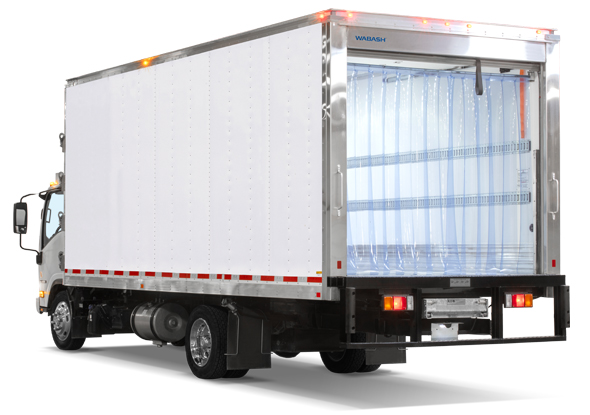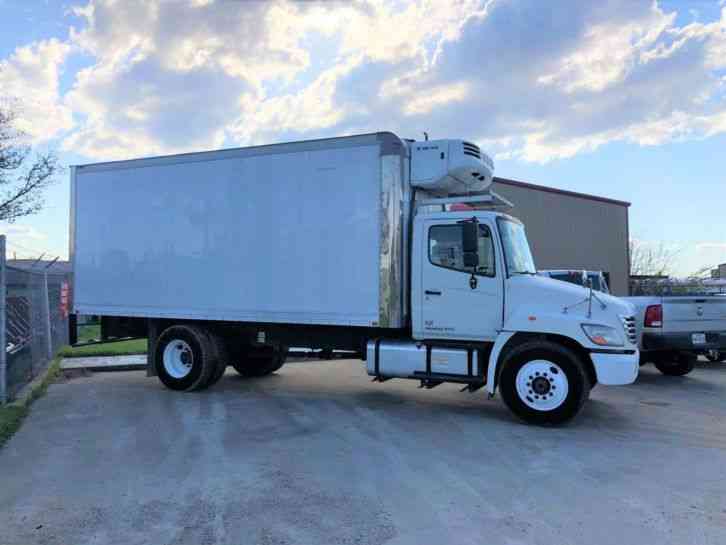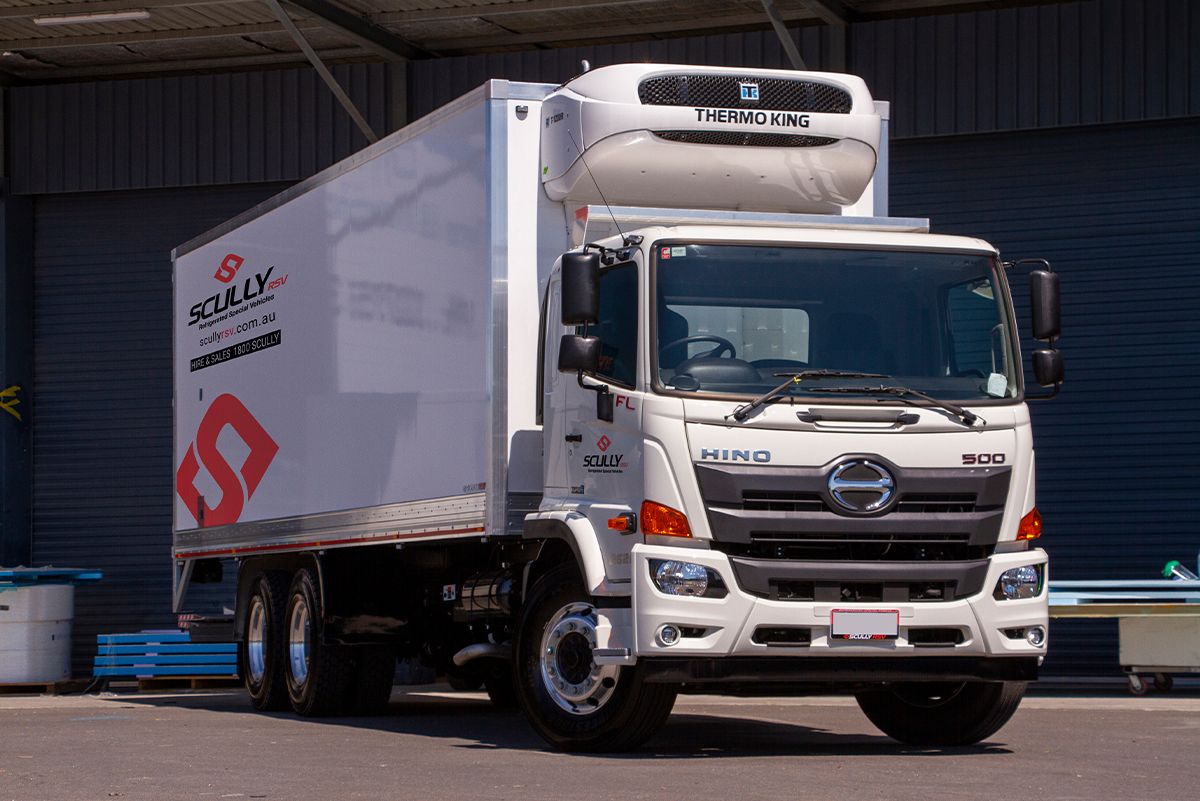Reefer Trucks Thermo King: Trusted for Temperature-Sensitive Goods
Reefer Trucks Thermo King: Trusted for Temperature-Sensitive Goods
Blog Article
Top Developments in Transportation Refrigeration: Enhancing Performance and Safety
The landscape of transport refrigeration is going through considerable improvement, driven by innovations aimed at boosting both performance and security. As these technologies proceed to develop, it is essential to explore their implications on operational techniques and governing compliance, prompting a more detailed examination of how they improve the future of transport refrigeration.
Smart Temperature Keeping An Eye On Systems
In the world of transportation refrigeration, clever temperature level tracking systems have arised as an important innovation for making sure the stability of temperature-sensitive products. These advanced systems leverage Web of Points (IoT) innovation to provide real-time data on temperature level fluctuations, allowing drivers to maintain optimal conditions throughout the supply chain. By constantly tracking the temperature of refrigerated containers and lorries, companies can promptly determine inconsistencies that might compromise item top quality.

Additionally, wise surveillance systems often integrate automated notifies and notifications, permitting stakeholders to respond promptly to any prospective concerns. This aggressive strategy not only reduces the danger of wasting but also improves compliance with governing standards controling food safety and pharmaceutical transport.
The assimilation of information analytics within these systems likewise helps with predictive upkeep, aiding operators to predict prospective tools failings before they happen. This capacity minimizes downtime and maximizes functional performance, ultimately bring about set you back financial savings.
Eco-Friendly Refrigerants
Smart temperature level tracking systems play a crucial duty in maintaining product high quality, but the effectiveness of transportation refrigeration additionally depends upon the option of cooling agents made use of. As environmental concerns increase, the shift towards green refrigerants has actually come to be important. Traditional refrigerants, such as hydrofluorocarbons (HFCs), are well-known for their high Worldwide Warming Potential (GWP), adding substantially to environment change. In contrast, emerging options like hydrocarbon-based cooling agents and hydrofluoroolefins (HFOs) existing lower GWP options, offering both performance and sustainability.
These environment-friendly refrigerants not only minimize ecological influence but likewise line up with worldwide policies focused on terminating hazardous substances. Their fostering can bring about boosted energy efficiency, ultimately reducing operating prices for transport refrigeration systems. The usage of natural refrigerants, such as ammonia and carbon dioxide, has obtained traction due to their exceptional thermodynamic residential or commercial properties and lower ecological impact.
Purchasing green cooling agents is not just a regulative conformity procedure; it stands for a critical decision that enhances brand online reputation and promotes client commitment. reefer trucks thermo king. By focusing on lasting practices, firms can contribute to a greener future while making certain the honesty of delivered goods
Advanced Insulation Products
Utilizing advanced insulation products is essential for maximizing transport refrigeration systems, as they substantially boost energy performance and preserve constant temperature control. Traditional insulation techniques often drop brief in stopping thermal transfer, bring about enhanced energy usage and changing temperature levels within cooled compartments.
Arising materials such as vacuum cleaner protected panels (VIPs) and aerogels use superior thermal resistance, allowing for great site thinner profiles without jeopardizing efficiency. VIPs, as an example, make use of a vacuum cleaner layer to decrease conductive and convective warmth transfer, making them perfect for space-constrained applications. Aerogels, recognized for their porous and light-weight structure, give outstanding insulation while significantly lowering overall system weight.
Moreover, including stage change products (PCMs) into insulation systems can additionally support temperatures during transit. These materials absorb and launch thermal power, successfully buffering against outside temperature variants.
The combination of these advanced insulation products not just lowers the functional expenses associated with energy consumption yet likewise extends the service life of temperature-sensitive goods. As the transportation refrigeration sector remains to progress, the fostering of innovative insulation technologies will certainly be pivotal in improving both efficiency and safety and security in cooled transportation.
Automated Path Optimization
The efficiency of transport refrigeration systems is greatly enhanced with automated route optimization, which leverages sophisticated algorithms and real-time data to determine one of the most effective courses for delivery. By examining numerous variables such as web traffic patterns, climate condition, and delivery windows, these systems can substantially reduce traveling time and fuel intake.
Automated course optimization reduces human error and subjective decision-making, which can result in inadequacies. This technology makes it possible for fleet supervisors to allot sources better, making certain that chilled items keep their called for temperature throughout the journey. By maximizing routes, firms can additionally boost client contentment via timely shipments.
Furthermore, automated systems can adjust to unexpected situations, such as road closures or unexpected traffic spikes, allowing for dynamic rerouting. This adaptability not only shields the integrity of temperature-sensitive products however also adds to overall operational effectiveness.
Implementing automated route optimization can result in considerable cost try this website financial savings while decreasing the carbon footprint associated with transportation. As organizations significantly prioritize sustainability, this development stands out as an essential component in modern transport refrigeration, straightening operational goals with environmental duty. Eventually, automated course optimization represents a significant innovation in the pursuit for performance and safety and security in transport refrigeration.

Real-Time Information Analytics
Automated route optimization dramatically gain from the assimilation of real-time information analytics, which offers essential understandings into the performance of transportation refrigeration systems. By using real-time data, transport drivers can monitor temperature fluctuations and devices efficiency, making certain more helpful hints that disposable products are maintained within called for criteria throughout transportation. This aggressive approach not just improves the quality of the carried products however additionally minimizes the danger of wasting and loss.

Along with improving performance, real-time analytics boosts security by making certain conformity with regulatory requirements for temperature control. This not only protects public health but additionally strengthens a business's credibility - refrigerated transportation thermo king. As the transport refrigeration market evolves, the integration of real-time information analytics becomes a foundation for driving technology, sustainability, and functional excellence
Final Thought
Finally, the advancements in transportation refrigeration substantially improve both efficiency and safety within the sector. Smart temperature surveillance systems and real-time data analytics supply essential oversight, while environment-friendly cooling agents and progressed insulation products contribute to sustainability and power efficiency. Automated course optimization algorithms not just decrease traveling time yet likewise minimize ecological influence. Collectively, these technologies stand for a vital advancement in transportation refrigeration, ensuring compliance with governing standards and advertising a greener future.
The landscape of transportation refrigeration is going through considerable transformation, driven by innovations aimed at improving both performance and safety and security.Smart temperature level monitoring systems play an essential duty in keeping product high quality, but the effectiveness of transport refrigeration likewise hinges on the option of refrigerants used. Their fostering can lead to improved power effectiveness, eventually reducing operating costs for transportation refrigeration systems. Inevitably, automated path optimization stands for a significant advancement in the pursuit for efficiency and security in transportation refrigeration.
In verdict, the advancements in transportation refrigeration dramatically enhance both efficiency and safety and security within the industry.
Report this page